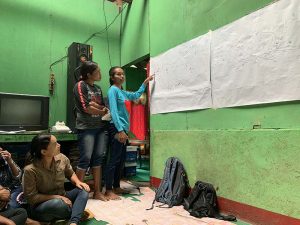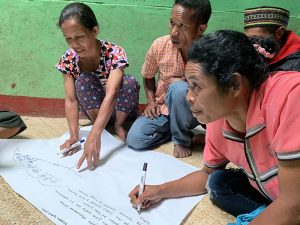ISF and Plan Indonesia spent six days across two rural communities in Manggarai, Indonesia learning how climate change interacts with gender and social inclusion in WASH. During our visits, which took place 19 – 24 August, we trialled a blend of research and practitioner-oriented activities.
These field activities taught us about climate change and inclusive WASH, enabled community members to hear different perspectives from their fellow village residents, and showed that some seemingly simple activities can be eye-opening and inspire aspiration for change.

Climate change is a difficult concept to understand, but women, men and people with disabilities in rural Indonesia experience climate stress regularly and know the impacts of climate variability and extremes on their WASH access well. Given the opportunity to explain the impacts, verbally or through drawing, the community members made it plain to see the challenges that climate change pose for them.

For example, open defecation free status has been achieved in these communities, but it doesn’t last if the dry season persists for too long and there’s no water available for sanitation. Men sometimes help women with the burden of water collection and other WASH workloads, but when climate stress ruins agrarian livelihoods and the men resort to leaving for urban areas in search of another source of income, women’s burdens often increase. And how can people with physical disabilities raise the challenges of a slippery hillside on the way to the spring when there is heavy rain, if they aren’t able to attend community meetings about water? Each of these issues became apparent after we carefully considered what different people might want to share and how.

Women and men from the community, young and old alike, took turns sharing their perspectives on how climate affects their WASH access following each activity. Together, we also discussed what households, the community, and the government can do to address the unequal impacts. It was certainly a learning experience for ISF, Plan Indonesia, and the community.

We are eager to share more details about the activities we did during our time with the communities and how we did them, but they are still a work in progress! In due time, we will release practical and useful guidance on assessing and responding to climate change impacts on WASH based on what we’ve learned.
